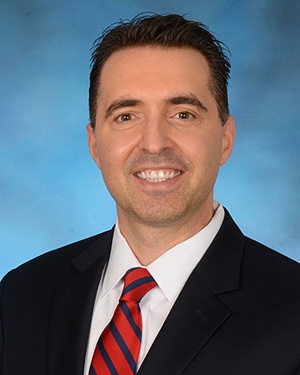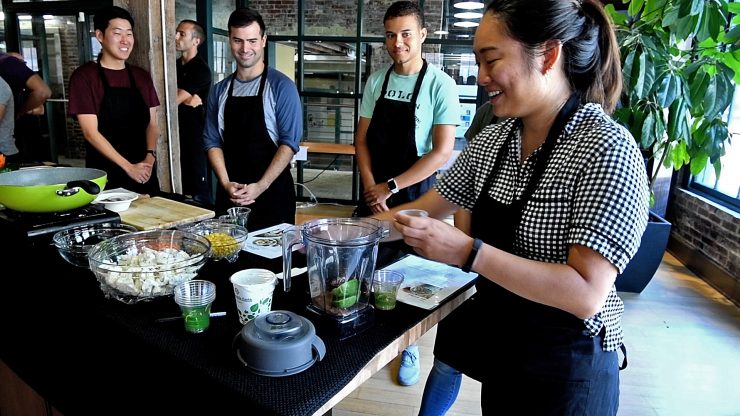They learn knife skills as they prepare meals, chopping garlic, onions, and cucumbers. They whip together ingredients for avocado chocolate mousse. And they learn about nutrition not just for their future patients, but also for themselves.
University of Maryland School of Medicine (UMSOM) students are now required to take part in a culinary medicine training course as part of the Renaissance Curriculum instituted in 2020.
The course is having the intended effects: Medical school students who took it reported feeling more confident in their nutritional knowledge and their abilities to counsel patients on healthy eating habits, according to a recent study from UMSOM. The study involved 119 UMSOM students who participated in the class and was published over the summer in the American Journal of Lifestyle Medicine.
To conduct the study, UMSOM researchers asked first-year medical students participating in the core curriculum culinary medicine course to complete a survey before and after taking the three-hour training. They found students were more than twice as likely to report being prepared for providing healthy eating recommendations to patients after taking the class, as compared to before taking the class.

“A robust two-thirds of medical school students felt prepared or very prepared to interact with patients to discuss healthy eating after taking this one class. This suggests that culinary medicine training in medical school is feasible, well-accepted, and associated with improvements in nutritional knowledge,” said study lead author Christopher D’Adamo, PhD, assistant professor of family and community medicine at UMSOM and director of the Center for Integrative Medicine.
In-Depth Nutrition Instruction
Guiding patients to pursue healthier eating habits can help prevent obesity as well as diseases that frequently result from poor diets such as heart disease, strokes, and cancer, he added.
The students receive in-depth nutrition instruction with data from the latest studies and learn about popular diets that their patients might ask about.
The course typically includes a nutrition lecture and cooking lessons in a test kitchen at the Institute for Integrative Health, a nonprofit organization based in Baltimore. But the instructors have had to adapt during the COVID-19 pandemic and conduct the training virtually this fall. For example, students may watch a lecture about ketogenic diets and then a demonstration recorded from the test kitchen where they learn knife skills and how to make keto recipes such as one-skillet chicken thighs with mushroom sauce.
“I think being a doctor involves a lot of not just clinical knowledge, but also life knowledge that you might need to pass on to your patients,” said Jag Kadiyala, who took the course pre-pandemic. “And for some of these patients, they may not know how to cook or what they can use and what’s affordable for them. By us learning, we can also share this knowledge with our patients and hopefully make it better for them as well.”
UMSOM student Kimia Abtahi agreed. “I believe this nutrition training for medical students is crucial to giving the best care possible to our patients — not only to treat their diseases but for prevention as well.”
The study found that 12 percent of students reported feeling “very prepared” for these interactions after taking the class, compared to 5 percent of those who had not yet taken the class; an additional 55 percent felt “prepared” after the class, compared to 34 percent before the class.
The study also found that none of the students reported feeling “not at all knowledgeable” about nutrition after the course, compared with nearly 5 percent who felt that way before taking the class. Students also reported that the class gave them practical tools for providing advice to their patients, including how to address barriers to healthy eating such as living in a low-income area where fresh produce can be scarce.
Strategies Relevant to Students’ Lives
Healthy eating and other self-care modalities also can benefit the medical school students themselves: Studies suggest self-care helps reduce stress among medical students and reduces symptoms of depression, burnout, and other mental health challenges associated with the demanding coursework.
“The strategies for overcoming healthy eating barriers that were presented in our course — including time, taste, cravings, and cost challenges — are also applicable to medical students. They reported these strategies were relevant to their own lives,” D’Adamo said.
Study co-authors included UMSOM’s Norman Retener, MD, assistant professor of medicine; Bernadette Siaton, MD, MEdHP, assistant professor of medicine; and Brian Berman, MD, professor emeritus of family and community medicine.
“This study provides scientific evidence to support important aspects of the new curriculum that we instituted last year in our medical school,” said E. Albert Reece, MD, PhD, MBA, executive vice president for medical affairs, University of Maryland, Baltimore, and the John Z. and Akiko K. Bowers Distinguished Professor and dean, UMSOM. “Our coursework focuses on actualizing the ‘Renaissance Physician.’ This kind of physician serves as an important guide for patients who are eager to feed themselves and their families with meals that are nutritious, delicious, and affordable.”




